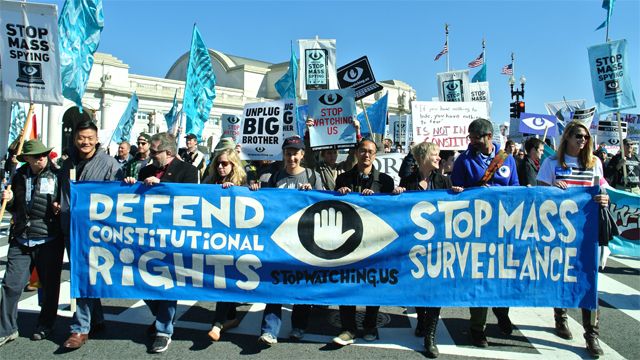
Ten years ago, when Moyers & Company guests John Nichols and Robert McChesney appeared on the series Now with Bill Moyers, they protested the lack of public involvement in decisions concerning mass media. “There are a handful of very interested parties who are deeply engaged,” Nichols said then, “ who think about it every day, who hire lobbyists, who spend a great deal of money, not merely to lobby Congress, but also, to lobby the FCC.”
Those “interested parties” — many of them multinational monoliths — have aggressively acquired and consolidated newspapers and magazines, radio and television stations and networks, movie studios and other media companies on and off the Web, weakening community and the freedom of speech.
But the public has a louder voice now, and more influence, in part because there arose from that conversation with Bill Moyers a media reform movement founded by McChesney and Nichols with Josh Silver. Free Press has become a leading presence in the progressive community nationwide, bolstering a faltering democracy in its advocacy of diverse media ownership, press freedom and quality journalism, a reinvigorated public broadcasting and universal, affordable Internet access.
In honor of the 10th anniversary of Free Press, I sat down with journalist and author Craig Aaron, who in 2011 became the organization’s president and CEO. You can listen to our audio conversation above, read the full transcript or skim the highlights below.
Thanks to John Light, who produced and edited this interview.
highlights
On the link between media consolidation and election spending
What we’re seeing this year, right now, is that it might be, by the time we’re done, the biggest year in history for the purchase of television stations, television station deals, which is pretty remarkable. There are a lot of stations changing hands right now, and there are a couple of factors at play. One is actually very closely tied to elections, and it’s that these stations, local television stations, still the number one news source for Americans, [are] vastly profitable, and largely because of election ads. If you’re in a swing state during an elections season, your local television broadcaster is making literally — or collectively, is making billions of dollars. Three billion dollars in the last election went into local television advertising. So it’s a market that a lot of investors and big companies are paying attention to.
On media coverage of Edward Snowden’s disclosures
It’s the best and worst of the media… In some ways it’s been so amazing, because — I mean, there’s this Watergate level, really — almost — of disclosures. The amazing work being done by The Guardian and by The Washington Post, and now The New York Times and Der Spiegel. All of these folks really digging into this story and telling us things that the government don’t want us to know, so we’re seeing the best of what journalism can still be.
But overall, I think the debate has been a lot of like “What motivated Snowden?” and these sort of personal stories, not as much about the revelations. I think that a lot of the media has struggled to cover the complex nature of the story. So I think it’s been good and bad, but a lot of the problems that the media has are exacerbated in this.
But I’m more positive than negative, because I think that it’s shown just how important this kind of investigative journalism is. It’s shown just how important it is to have reporters out there working beats, developing sources. And it’s shown that somebody like Glenn Greenwald, you know, sort of in a quasi-official status with The Guardian, just how important the work someone like that can do. And I think that’s certainly a net positive for journalism, even if I wouldn’t hand out all gold stars on the coverage.
Recommendations for fighting government surveillance
I would urge you — and this is something we’re going to be organizing at Free Press with some of our allies — to set up meetings with your members of Congress when they’re back in their districts. That made a huge difference. We came within seven votes of defunding these spying efforts in the House, with a bipartisan bill. Very close. Much closer than the leaders of either party expected. And that’s because when people went home they heard about this. Same thing happened with Syria and the potential bombing there. So that’s the number one thing you can do is get involved.
I think the other thing you can do is educate yourself. The Guardian just put out a great explainer, a great synopsis of everything that’s been going on here. You definitely need to be reading that, paying attention to the journalists who are doing this. I think in the longer term though, we’re going to have to do some local organizing. Press freedom is going to have to be an issue that matters for more than just journalists and journalism organizations. That’s on journalists, but it’s also on the public to get involved and get educated. So we’ll be rolling out a number of things over the next two or three months, ways for people to get engaged and involved, events that will be happening across the country.
On the future of public media
Ultimately, if we’re going to have quality news and information in local communities across the country, not just covering the White House, not just covering niche issues, we’re going to have to invest in public and noncommercial media. And right now we spend a fraction of what the rest of the world spends, $1.50 per capita per year. A cup of coffee. England is spending $80 dollars per capita, the Scandinavian countries are spending $100 dollars per capita. And they’re getting good value for their money, much better journalism. I just don’t see a better way to put journalists back to work than public investment. And I’m afraid it’s going to have to get worse before it gets better, but I think it’s the only solution I’ve found to how you deal with this crisis in journalism. That doesn’t mean you get rid of the commercial media, but it means you need a counterweight and you need to invest.


